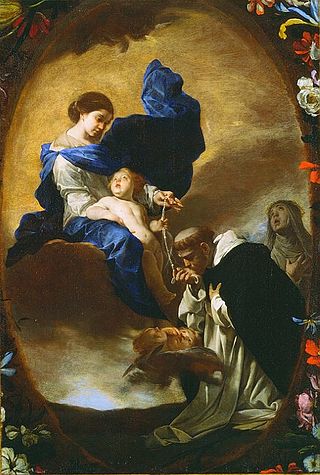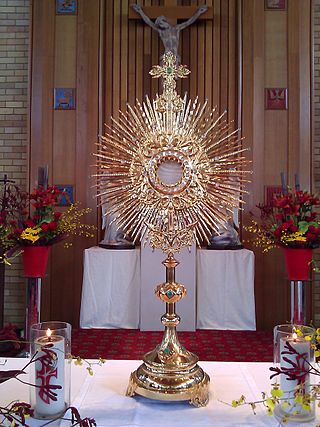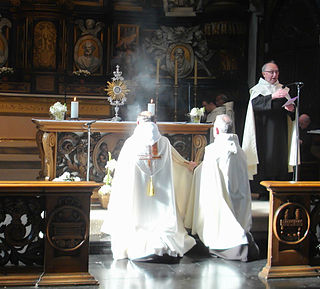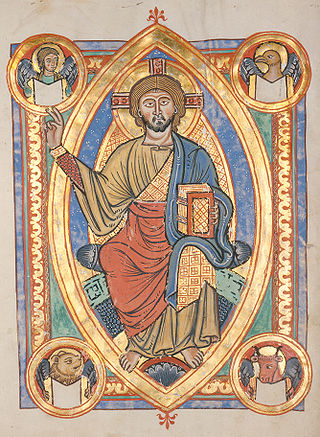
The Rosary, formally known as the Psalter of Jesus and Mary, also known as the Dominican Rosary, refers to a set of prayers used primarily in the Catholic Church, and to the physical string of knots or beads used to count the component prayers. When referring to the prayer, the word is usually capitalized ; when referring to the prayer beads as an object, it is written with a lower-case initial letter.

The Most Sacred Heart of Jesus is one of the most widely practised and well-known Catholic devotions, wherein the heart of Jesus Christ is viewed as a symbol of "God's boundless and passionate love for mankind". This devotion to Christ is predominantly used in the Catholic Church, followed by high church Anglicans, and some Western Rite Orthodox. In the Latin Church, the liturgical Solemnity of the Most Sacred Heart of Jesus is celebrated the third Friday after Pentecost. The 12 promises of the Most Sacred Heart of Jesus are also popular.

The Litany of the Blessed Virgin Mary is a Marian litany originally approved in 1587 by Pope Sixtus V. It is also known as the Litany of Loreto, after its first-known place of origin, the Shrine of Our Lady of Loreto (Italy), where its usage was recorded as early as 1558.

The Feast of the Sacred Heart is a solemnity in the liturgical calendar of the Roman Rite of the Catholic Church. According to the General Roman Calendar since 1969, it is formally known as the Solemnity of the Most Sacred Heart of Jesus and celebrated on the second Friday after Trinity Sunday Some Anglican Franciscans keep the feast under the name of the Divine Compassion of Christ.

Eucharistic adoration is a devotional practice primarily in Western Catholicism and Western Rite Orthodoxy, but also to a lesser extent in certain Lutheran and Anglican traditions, in which the Blessed Sacrament is adored by the faithful. This practice may occur either when the Eucharist is exposed, or when it is not publicly viewable because it is reserved in a place such as a tabernacle.

The "Salve Regina", also known as the "Hail Holy Queen", is a Marian hymn and one of four Marian antiphons sung at different seasons within the Christian liturgical calendar of the Catholic Church. The Salve Regina is traditionally sung at Compline in the time from the Saturday before Trinity Sunday until the Friday before the first Sunday of Advent. The Hail Holy Queen is also the final prayer of the Rosary.

Catholic Mariology is the systematic study of the person of Mary, mother of Jesus, and of her place in the Economy of Salvation in Catholic theology. According to the doctrine of the Immaculate Conception taught by the Catholic Church, Mary was conceived and born without sin, hence she is seen as having a singular dignity above the saints, receiving a higher level of veneration than all angelic spirits and blessed souls in heaven. Catholic Mariology thus studies not only her life but also the veneration of her in daily life, prayer, hymns, art, music, and architecture in modern and ancient Christianity throughout the ages.

Benediction of the Blessed Sacrament, also called Benediction with the Blessed Sacrament or the Rite of Eucharistic Exposition and Benediction, is a devotional ceremony, celebrated especially in the Roman Catholic Church, but also in some other Christian traditions such as Anglo-Catholicism, whereby a bishop, a priest, or a deacon blesses the congregation with the Eucharist at the end of a period of adoration.
Munificentissimus Deus is an apostolic constitution published in 1950 by Pope Pius XII. It defines ex cathedra the dogma of the Assumption of the Blessed Virgin Mary. It was the first ex-cathedra infallible statement since the official ruling on papal infallibility was made at the First Vatican Council (1869–1870). In 1854 Pope Pius IX made an infallible statement with Ineffabilis Deus on the Immaculate Conception of the Virgin Mary, which was a basis for this dogma.

Catholic devotions are particular customs, rituals, and practices of worship of God or honour of the saints which are in addition to the liturgy of the Catholic Church. The United States Conference of Catholic Bishops describes devotions as "expressions of love and fidelity that arise from the intersection of one's own faith, culture and the Gospel of Jesus Christ". Devotions are not considered part of liturgical worship, even if they are performed in a church or led by a priest, but rather they are paraliturgical. The Congregation for Divine Worship at the Vatican publishes a Directory on Popular Piety and the Liturgy.

The Society of the Holy Name, formally known as the Confraternity of the Most Holy Name of God and Jesus, is a Roman Catholic confraternity of the laity and is one of several which are under the care of the Dominican Order. It is open to all Catholic adults. The primary object of the society is to beget reverence for the Holy Name of God and Jesus Christ; it is also dedicated to making reparations, in particular, for blasphemy, perjury and immorality.

Mary, the mother of Jesus in Christianity, is known by many different titles, epithets, invocations, and several names associated with places.

Reparation is a Christian theological concept closely connected with those of atonement and satisfaction. In ascetical theology, reparation is the making of amends for insults given to God through sin, either one's own or another's. The response of man is to be reparation through adoration, prayer, and sacrifice. In Roman Catholic tradition, an act of reparation is a prayer or devotion with the intent to expiate the "sins of others", e.g. for the repair of the sin of blasphemy, the sufferings of Jesus Christ or as Acts of Reparation to the Virgin Mary.

The theology of Pope Pius XII is reflected in his forty-one encyclicals, as well as speeches and nearly 1000 messages, during his almost 20-year pontificate. The encyclicals Mystici corporis and Mediator Dei advanced the understanding of membership and participation in the Catholic Church. The encyclical Divino afflante Spiritu began opening the door to historical-critical biblical studies. But his magisterium was far larger and is difficult to summarize. In numerous speeches Catholic teaching is related to various aspects of life, education, medicine, politics, war and peace, the life of saints, Mary, the mother of God, things eternal and temporal.

May devotions to the Blessed Virgin Mary refer to special Marian devotions held in the Catholic Church during the month of May honoring Mary, mother of God, as "the Queen of May". These services may take place inside or outside. A "May Crowning" is a traditional Roman Catholic ritual that occurs in the month of May.

Throughout history, Catholic Mariology has been influenced by a number of saints who have attested to the central role of Mary in God's plan of salvation. The analysis of Early Church Fathers continues to be reflected in modern encyclicals. Irenaeus vigorously defended the title of "Theotokos" or Mother of God. The views of Anthony of Padua, Robert Bellarmine and others supported the doctrine of the Immaculate Conception of the Virgin Mary, which was declared a dogma in 1850.

The Mariology of the popes is the theological study of the influence that the popes have had on the development, formulation and transformation of the Roman Catholic Church's doctrines and devotions relating to the Blessed Virgin Mary.

The Roman Catholic tradition includes a number of devotions to Jesus Christ. Like all Catholic devotions, these prayer forms are not part of the official public liturgy of the church but are based on the popular spiritual practices of Roman Catholics. Many are officially approved by the Holy See as suitable for spiritual growth but not necessary for salvation.

The "Alliance of the Hearts of Jesus and Mary" is a phrase coined by Pope John Paul II during his Angelus Address of September 15, 1985. Discussing devotion to the Sacred Heart of Jesus and the Immaculate Heart of Mary, he said that "...though distinct, they are interrelated by reason of the enduring relation of love that exists between the Son and his Mother." Subsequently, several symposia were held to examine the roots and implications of devotion to the Sacred Heart. Since there had already been much research on Devotion to the Sacred Heart, the conferences tended to focus on the devotion to the Immaculate Heart of Mary from the perspective of Sacred Scripture and Tradition.
The following outline is provided as an overview of and topical guide to the Catholic Church:


















